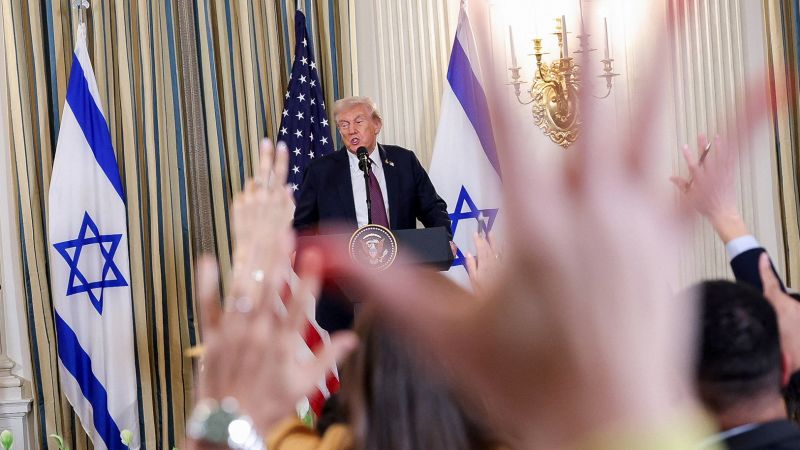
More than a month after U.S. President Donald Trump announced a ceasefire in Gaza, a crucial element of his peace plan remains unrealized. The plan, which includes a 20-point strategy, calls for a multinational force to stabilize the war-torn enclave. However, potential participants have voiced concerns over the lack of finalized details regarding the force’s mandate.
Trump unveiled his strategy to end the conflict in Gaza on September 29, emphasizing that the International Stabilization Force (ISF) was to deploy “immediately.” The ISF’s objectives include training Palestinian police, securing borders with Israel and Egypt, blocking munitions inflow, and facilitating the withdrawal of Israeli troops from Gaza.
Challenges in Forming the International Stabilization Force
The initial phase of the ceasefire involved the exchange of hostages from Gaza and Palestinian prisoners from Israel. The subsequent phase, which hinges on the establishment of the ISF, has yet to see formal commitments from any nations. Although U.S. officials have suggested several possible contributors, these nations are seeking clarity and assurances before committing troops to a region fraught with armed militias, criminal gangs, and the persistent threat of Israeli strikes.
A Middle East official familiar with the discussions revealed that potential participants are still negotiating with the U.S. over critical issues. These include the size of the force, the number of personnel each nation will contribute, the chain of command, leadership in decision-making, and the deployment’s duration.
Concerns and Conditions from Potential Participants
Israel has expressed apprehension regarding the composition of the force, particularly opposing the involvement of nations it perceives as antagonistic, such as Turkey. Turkey played a significant role in facilitating the ceasefire with Hamas, raising concerns for Israel.
“These matters of composition, lack of clarity around the specifics of, for example, the disarmament mandate, and the uncertainties around what interaction and coordination will inevitably entail with the Israel Defense Forces, undoubtedly raise challenges for launching,” said Lucy Kurtzer-Ellenbogen, a senior fellow with the Middle East Institute.
Some potential participants have stipulated that the force should only be transitional, with a capped timeline until an “empowered” Palestinian Authority can assume full control of Gaza. Additionally, there are calls for an international mandate to formalize the ISF’s legitimacy. Some nations have demanded a United Nations Security Council resolution, while U.S. Secretary of State Marco Rubio suggested that an international agreement could provide the necessary mandate.
“We’re working on some language on that now that hopefully will be in place… we will need something… because some of these countries by their own laws can’t participate in these efforts unless they have some sort of international mandate or flag that they’re under,” Rubio stated during a visit to Jerusalem.
Debate Over the Nature of the Force
Jordan’s King Abdullah II emphasized the importance of defining the ISF’s role as either a “peacekeeping” or “peace enforcing” force. In an interview with the BBC, he warned that nations would be reluctant to participate if the force was tasked with “peace enforcing,” which could involve patrolling Gaza with weapons.
“What is the mandate of security forces inside of Gaza? And we hope that it is peacekeeping, because if it’s peace-enforcing, nobody will want to touch that,” he warned.
Additional concerns include the armament level of the troops, their interaction with the Israeli military, and their readiness to intervene in internal conflicts within Gaza. U.S. officials have identified several countries as potential participants, including Egypt, Qatar, the United Arab Emirates, Indonesia, Azerbaijan, and Turkey. Pakistan has also expressed interest in joining the force.
Israel’s Stance and Future Implications
Israeli Prime Minister Benjamin Netanyahu stated that Israel would decide which international forces are acceptable to enter Gaza post-conflict. During a press conference in Israel, U.S. officials addressed questions about Turkish involvement, asserting that any foreign troops stationed in Gaza would require Israel’s explicit consent.
“What troops are on the ground in Israel – and Gaza – is going to be a question the Israelis have to agree to,” remarked a U.S. official, praising Turkey’s “very constructive” role in facilitating the ceasefire.
Netanyahu’s office reaffirmed Israel’s commitment to the plan, welcoming a “responsible and potent ISF” as a crucial step towards achieving stability in the region. As negotiations continue, the formation of the ISF remains a pivotal aspect of Trump’s peace initiative, with significant implications for the future governance and security of Gaza.







